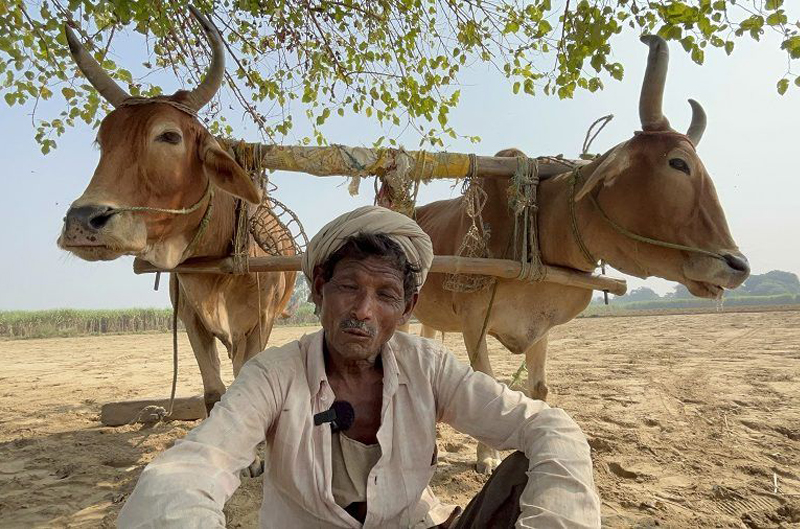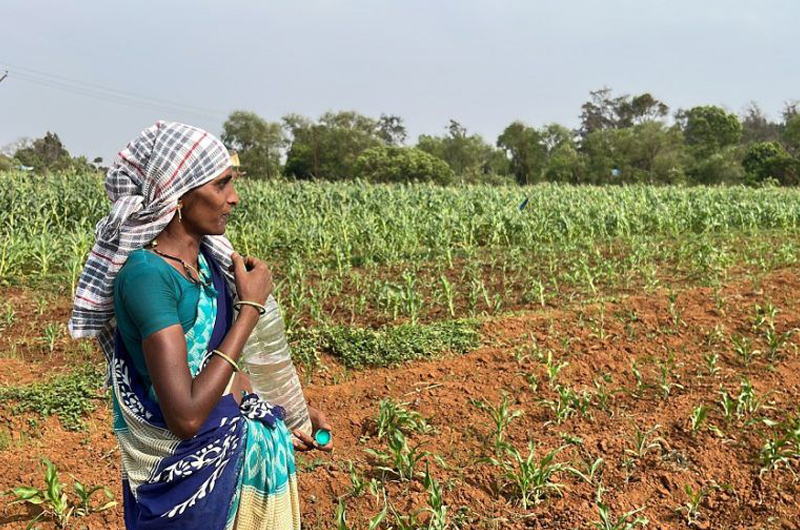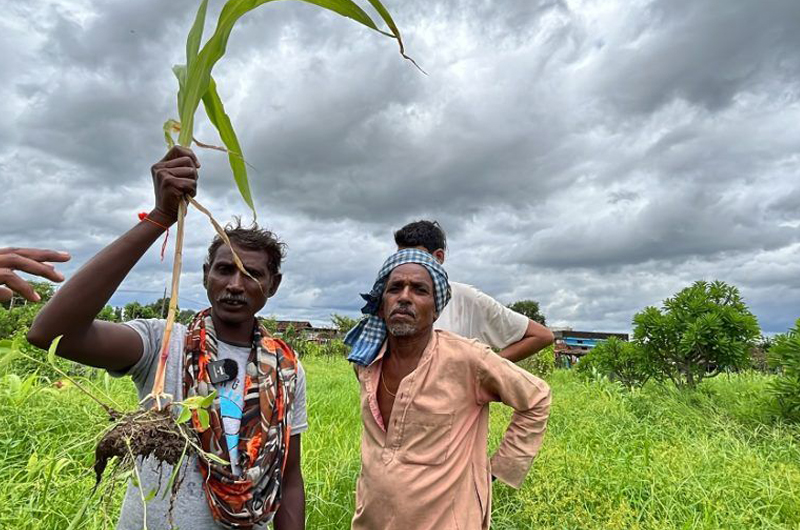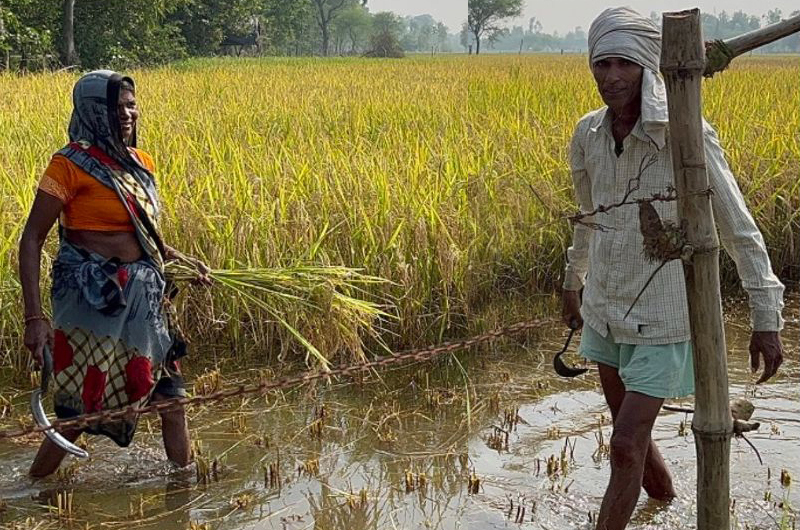Unseasonal or high intensity rainfall is regularly damaging crops across India over the past few years. Usually, farmers get some compensation for the damage. But the primarily landless farmers and tenant farmers working on leased land do not qualify for compensation from the government as only those who own the land get compensated for crop loss because of weather events. Giving farmland on lease is illegal in many states of India. Farming on another person’s land is done through informal or verbal contracts with shared benefits. A detailed report by Arvind Shukla
Ram Sagar, 64, a farmer who lives in Turkauli Village of Barabanki District in Uttar Pradesh, lost three and a half acres of paddy crop due to heavy, unseasonal rains in October 2022. Another resident of the village, 42-year-old Jabir Ali, also lost an acre of paddy. As per the state government’s promise, Sagar will soon get the compensation, but Ali, a contract farmer farming on someone else’s land, will not get any.

The story of Channu Lal Rajput of Thekua Village in Sitapur District of Uttar Pradesh, about 15 kilometres from Turkauli, is like that of Ali. He had taken 2.5 acres of land on contract, but the crop suffered heavy damage due to intense rain. And just like many other tenant farmers, locally known as bataidaars, Rajput too will not get any compensation for his loss. Standing in almost knee-deep water, Rajput, 50, cursed the day he had taken up paddy cultivation on contract. Heavy rains in October destroyed his ripened crop. In 2022, his wheat and mentha crops also got damaged due to extreme rainfall.
“I do not own even an inch of land. I had to give the farm owner 12 quintals (1,200 kilograms) of paddy for his land. This is part of the verbal agreement with the landowner. I spent about Rs 30,000 on cultivating this, but I do not think I will even recover the cost,” Rajput said. He had taken Rs 30,000 from a moneylender in July-August 2022 at 5 per cent interest. He calculated that if he managed to harvest 50-55 quintals of rice from the farm, he would have enough to give to the farm owner and would get sufficient for his need as well. But now, Rajput and many more like him are in deep trouble. Since the past few years, weather events such as floods, drought, excessive rainfall, and unseasonal rains have taken a toll on the farm sector, and the farmers are facing losses.

A senior official from the Uttar Pradesh Relief Commissioner office told Mongabay-India on December 6, 2022, that crops of 1.1 million farmers in 51 districts were damaged due to heavy rains and floods in October that year, affecting about 80,000 hectares of land. The state government released Rs. 200 crores (Rs two billion) for 42,000 hectares of the affected land while the process is on for the rest of the area. But this does not signal any relief for contract farmers. A lekhpal (local revenue assistant), Nripendra Yadav, who is from a village close to the Ghaghra River in Sitapur District, told Mongabay-India, “In case of crop loss, only those who own the land will get compensation. Because on entering the gata number or khasra number (a unique number assigned to a parcel of land in rural areas) on the government’s portal, only the registered name is considered as the beneficiary. There is no rule for the contractor.”
Mongabay-India further confirmed the same with the Relief Commissioner’s Office in Uttar Pradesh. A senior officer stated, “We work under the guidelines of central government’s disaster management policy, in which there are no specifications for landless or tenant farmers.” These guidelines mean that several farmers, such as Rajput and Ali, will not receive compensation for their crop loss due to weather events. Farmers like them take the land of others on contract to do farming and, in return, give the owners a share of the crop or a fixed monetary amount. Most of the work of farming on other’s land is through informal or verbal contracts, which are not legally valid. In this arrangement, the entire risk is of the cultivator. Compensation is not the only pain of these farmers – they are also left out of government schemes. For instance, the tenant farmers neither get the Rs 6,000 per year from the Pradhan Mantri Kisan Samman Nidhi nor get an agriculture loan (KCC) at 4 per cent, as is provided for farmers. They are also not entitled to crop insurance schemes. The scheme says, “To provide income support to all landholding farmers’ families in the country, having cultivable land.”
Limited data
Though there are millions of such farmers across India, the government claims to have no clear data on landless and migrant farmers. On July 26, 2022, while replying to a parliament question about landless farmers or plans to enroll such farmers with government schemes, Union Agriculture and Farmers Welfare Minister Narendra Singh Tomar said, “There is no specific survey/enumeration of landless farmers and migrant landless farmers in the country.” “Hence the actual number is not available. But according to the agriculture census 2015-16, the number of fully leased holdings in the country is 531,285, which means these are the only holdings (fields) whose officially written contract has been made.”
Despite the lack of this data, there are other surveys indicating that the share of leased holdings is increasing in the country. According to the National Statistical Office (NSO) report, Situation Assessment of Agricultural Households Survey for 2018-19, 17.3 per cent of the country’s total 101.98 million hectares of operational land holding (land for agricultural production) is leased-in land. It is 13 per cent of the total cultivable land of the country. As per the NSO data, 9.9 per cent of operational holding was leased-in in 2002-03. It increased to 13.7 per cent in 2012-13 and 17.3per cent in 2018-19. In India, there are two prevalent ways of leasing-in land where a household takes land on rent or for free without any right of permanent or heritable possession. Sharecropping is a traditional arrangement where both the landowner and farmer pool in resources and the input cost and yield are divided between them. In the other arrangement, a tenant farmer undertakes farming on another person’s land, in turn paying rent, share crop yield, or tax.
Climate change increasing vulnerability
The kharif (monsoon crop) 2022 season is not the first-time farmers’ crops have been damaged. Early in the year, untimely rains hit potato and mustard crops in India. Farmers were not spared in March too when the country witnessed the hottest month in the past 122 years. The heat waves decreased the production of wheat. Govardhan, an elderly farmer from Muda Kala Village in the Sitapur District of Uttar Pradesh, said, “If the crop fails, nothing (compensation or insurance) is available. The entire paddy crop has been ruined. In 2022, I lost my groundnut and sesame crops, which rotted due to excessive rains. We neither get crop insurance nor compensation.” To support his family of 10 people, Govardhan does contract farming on five acres of land. In the last 2-3 years, he has faced crop loss due to unfavourable weather several times. Two-thirds of India’s cultivable land is rainfed. Thus, there is a direct effect on agriculture in case of less or more rain, experts say.
Uttar Pradesh is the second-largest state in paddy production and accounts for one-third of the total wheat production. But both crops have come under the grip of seasonal climate fluctuations. During the sowing of paddy in 2022, it did not rain as required, and when the crop was somehow ready to ripen, the standing crop got ruined in September-October rainfall. A 2022 report on climate change, by Climate Transparency, a global partnership of experts and NGOs, highlights the increasing vulnerabilities. It said that between 2016-2021, due to extreme weather events such as floods, droughts, cyclones, untimely rains, and landslides in India, crops were damaged over an area of 36 million hectares, which cost the country Rs $3.75 billion. According to a 2019 IPCC special report on climate change and land, in a 1.5°C global warming scenario, India’s production of paddy, wheat, pulses, and coarse cereals could decline by about 9 per cent by 2050.
Kiran Kumar Vissa, co-founder of Rythu Swarajya Vedika, a Hyderabad-based farmers’ organisation promoting sustainable farming, says that farmers facing adversities need to be saved. “Farming is a natural phenomenon, completely dependent on the weather. The sharecropper farmers are the most troubled by climate change because they do not get support from anywhere. If the sharecroppers do not get a support system, then agriculture in the country will be ruined, will go into the hands of the companies and the campaign to deal with the climate will also suffer,” he adds.

Arvind Kumar Singh, a veteran journalist, and a rural policy expert emphasised that if one looks at the plains of northern Indian rivers such as Ganga and Yamuna, one will find that “educated and less landholding families have left the villages.” “Farming is dependent on common sharecroppers and tenants. The government may have given drought and flood compensation, but they will not be able to avail of it as it is going to the bank account of the farm owner. Even if the landholder farmers are facing a loss in farming, they still have a place to stand as they are beneficiaries of the government policies. But the sharecroppers do not have that access,” Singh added.
Leasing of land allowed under Indian laws?
Giving land on lease for farming is strictly prohibited in Uttar Pradesh, Bihar, Karnataka, Madhya Pradesh, and Telangana, although physically disabled people, widowed or divorced women, and armed forces personnel are exempt. Lease is illegal in Kerala, although some self-help groups are exempted. But it is not illegal in states such as Punjab, Maharashtra, Haryana, and Assam. Andhra Pradesh, Rajasthan, and West Bengal have simple laws regarding lease-sharing.
For the welfare of such farmers, to make it easier for them to take land on lease and link them to government schemes, in 2015, India’s planning commission (NITI Aayog) constituted a high-level Committee on the issue of agricultural land leasing under the chairmanship of late T. Haque, an agriculture economist. In October 2016, the committee in Report of the Expert Committee and Model Law on Agricultural Land Leasing claimed, “Because there is no written agreement between the owner and the sharecropper, or the lessor of the land, the sharecroppers are unable to take advantage of any scheme.” The committee said that after the implementation of the Model Land Leasing Act, farming would be easier on shared/leased land, agricultural productivity and income of landless farmers will increase, and the country’s GDP will also get support.
In 2016, when the report of NITI Aayog came out, there was a discussion for the implementation of the Model Land Leasing Act in 10 states of the country. Several rounds of meetings also took place. This was also in the Farmers (Empowerment and Protection) Agreement Ordinance, 2020 on Price Assurance and Agricultural Services, one of the three agricultural laws named Land Reform that came in 2020. Though, the government was forced to repeal these laws after the year-long protest by farmers.
While talking to Mongabay-India, former Union Minister of State for Agriculture Hukum Dev Narayan, termed the repeal of this law a big mistake. “The government had brought an agriculture law for such farmers who sow on the land of others. But then the farmers opposed it. Those who feared a loss due to these laws opposed them, and those who were to be benefited were supporting them. In such a situation, how will there be any initiative?” However, Vissa says, “We have been demanding laws to protect the interest of tenant farmers. But, the central government tabled those Acts to protect the interests of corporates, thus, we opposed them. These laws could have made tenant farmers vulnerable further.”
Few initiatives, yet to bear fruit
Few states have taken initiatives to protect tenant farmers. In 2011, Andhra Pradesh, which has the highest tenant hoarding (42.4 per cent) and area leased in (36.4 per cent), enacted a law to benefit sharecroppers. In 2014, Telangana, which was carved out of Andhra Pradesh, also implemented this scheme for one year. A co-founder of Rythu Swarajya Vedika (RSV), a Hyderabad-based farmers’ organisation promoting sustainable farming, Kiran Kumar Vissa explained that, in 2019, the Andhra Pradesh government repealed the 2011 Bataidar Act and implemented a new law, AP Crop Cultivator Rights law 2019, on the recommendation of NITI Aayog. “At that time, there were 700,000 sharecropper-lease farmers who were beneficiaries of a Crop Cultivator Right Card (CCRC). But in the new law, the government added a clause, under which the card made for the sharecropper must be signed by the farm owner and farmer. The farm owners were not ready to take the risk of the land, and the farmers kept moving away from it.”
“In 2022, we conducted a door-to-door survey among 3,885 farmers in 31 villages of nine districts of Andhra Pradesh, in which it came out that just 9.6 per cent had the card, and the biggest reason was that the landowner did not sign. We found that only 6 per cent of the landless sharecroppers are getting benefits under Rythu Bharosa, the cash support scheme of Andhra Pradesh. Telangana started this scheme LAC (loan eligibility card) after it was separated from Andhra Pradesh (2014) but stopped it after a year. This matter had also reached the court,” he said. National president of Rashtriya Kisan Mazdoor Mahasangh, Shivkumar Kakka said, “Farming is a state subject. Many states have made laws for sharecroppers, but these have never been implemented on the ground.”
(Courtesy: Mongabay India)



 from Webdoux
from Webdoux